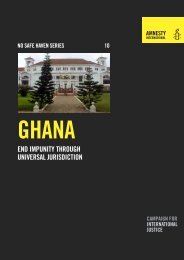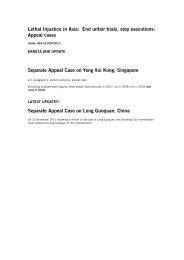read the report - Amnesty International
read the report - Amnesty International
read the report - Amnesty International
You also want an ePaper? Increase the reach of your titles
YUMPU automatically turns print PDFs into web optimized ePapers that Google loves.
NIGERIA<br />
‘WAITING FOR THE HANGMAN’<br />
49<br />
8/CONCLUSION<br />
<strong>Amnesty</strong> <strong>International</strong> and LEDAP call on <strong>the</strong> Nigerian government to declare a moratorium<br />
on executions. Under international human rights standards, capital punishment can only be<br />
used after <strong>the</strong> most exacting due process of law. However, as this <strong>report</strong> shows, <strong>the</strong> failures<br />
in <strong>the</strong> Nigerian criminal justice system breach international human rights law and standards.<br />
Suspects in capital offences and death row prisoners are denied <strong>the</strong>ir right to a fair trial and<br />
appeal process. The violation of an individual’s legal rights often starts at <strong>the</strong> point of arrest.<br />
Police routinely use torture to extract confessions as a substitute for thorough and impartial<br />
investigation of <strong>the</strong> crime. As a result <strong>the</strong> majority of death row prisoners were sentenced to<br />
death based on confessions. Most death row prisoners have waited between five and 10 years<br />
for <strong>the</strong>ir trial to be concluded; some were denied <strong>the</strong>ir right to legal representation.<br />
More than 40 juvenile offenders (people under <strong>the</strong> age of 18 at <strong>the</strong> time of <strong>the</strong> crime) are<br />
currently on death row, in clear violation of international human rights law. Approximately 80<br />
death row prisoners were denied <strong>the</strong> right to appeal because <strong>the</strong>y were sentenced to death<br />
by tribunals under <strong>the</strong> military regime, again a clear violation of international human rights<br />
law. Such is <strong>the</strong> chaos within <strong>the</strong> Nigerian criminal justice system that o<strong>the</strong>rs were unable<br />
to appeal because <strong>the</strong>ir case file had been lost, or because <strong>the</strong>y had no lawyer to represent<br />
<strong>the</strong>m as <strong>the</strong>y fought for <strong>the</strong>ir lives. While <strong>the</strong> system fails to work, 736 prisoners on death<br />
row wait to see if <strong>the</strong>y are to die. As one prisoner put it, “we are waiting for <strong>the</strong> hangman”.<br />
The Nigerian authorities have made some attempts to address <strong>the</strong> failures of <strong>the</strong> judicial<br />
systems by establishing commissions of inquiry. Several Nigerian study groups established<br />
under President Obasanjo underlined <strong>the</strong> urgent need to address <strong>the</strong> issue of <strong>the</strong> death<br />
penalty. The 2004 National Study Group on Death Penalty and <strong>the</strong> 2007 Presidential<br />
Commission on <strong>the</strong> Administration of Justice both stressed that <strong>the</strong> Nigerian criminal justice<br />
system cannot guarantee a fair trial. The Study Group concluded: “We must consider whe<strong>the</strong>r<br />
<strong>the</strong> death penalty has succeeded in lowering <strong>the</strong> tempo and rampage of crime in Nigeria or<br />
whe<strong>the</strong>r it has contributed to violent crimes. We must consider whe<strong>the</strong>r Nigerians can<br />
continue to cling to <strong>the</strong> death penalty when o<strong>the</strong>r countries are gradually retreating from <strong>the</strong><br />
death penalty and are building more humane societies for <strong>the</strong>ir people. We must <strong>the</strong>refore<br />
impose at least a five-year moratorium on <strong>the</strong> death penalty”. In 2007, <strong>the</strong> Presidential<br />
Commission reiterated <strong>the</strong> call for a moratorium on <strong>the</strong> death penalty.<br />
However, nei<strong>the</strong>r <strong>the</strong> federal government nor state governments have taken any action to<br />
address <strong>the</strong> urgent problems highlighted by <strong>the</strong> two study groups. On <strong>the</strong> contrary, at least<br />
seven condemned prisoners, including six who never had an appeal, were secretly executed<br />
in 2006, bringing <strong>the</strong> total of executions between May 1999 and 2008 to at least 22, and<br />
Index: AFR 44/020/2008 <strong>Amnesty</strong> <strong>International</strong> October 2008

















